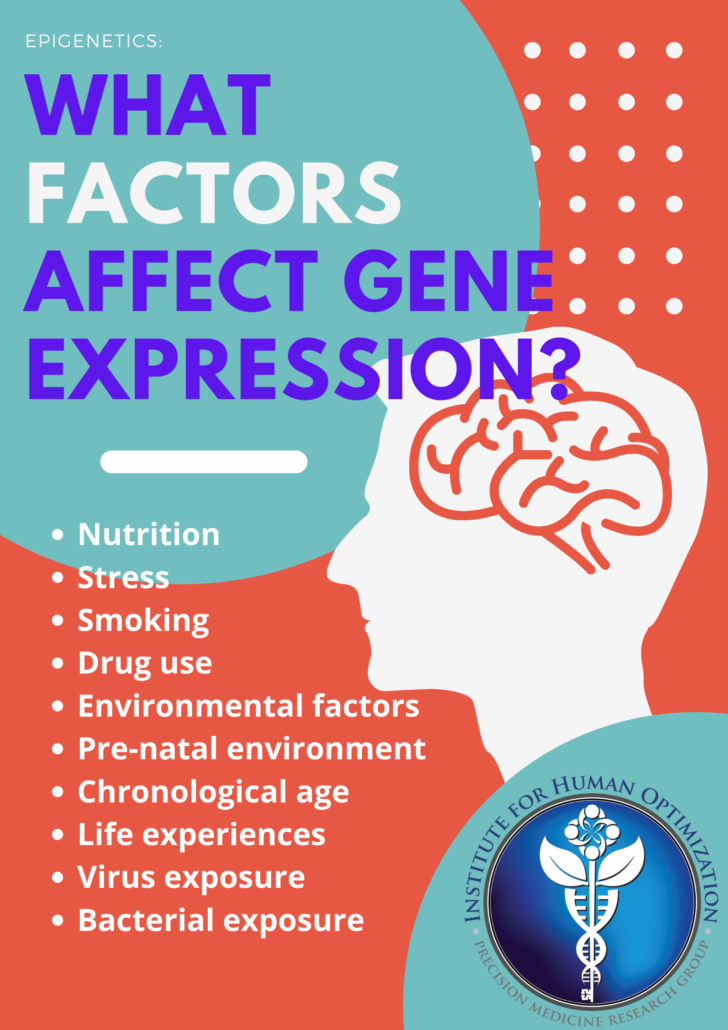Epigenetics: How to Control Your Gene Expression
At the Institute for Human Optimization, we take a genome to phenome approach to healthcare. This means we don’t just take into consideration your current symptoms, but take a deep dive into what’s happening in your body and how we can prevent disease before symptoms even occur. To do this, we use the latest technology to test your blood markers, biome, and genetics, to create a health plan tailored just for you. In this article, we’ll discuss epigenetics, how they relate to environmental factors, and how you can test your biological age.
Nothing in the biological world happens alone. From the physical to the quantum, everything is influencing everything else. The human body is a perfect example of this.
In every one of your cells is the double-helix blueprint that tells them how they should behave. This is your DNA, passed down through millions of years, slowly changing as natural selection takes its course. If DNA propagating white fur helps a bear live amongst snow and ice, its descendants become polar bears. If a longer neck helps a deer survive in a land of tall trees, its descendants become giraffes.
DNA changes gradually but is relatively fixed. You can’t make your brown eyes blue just like the giraffe can’t become an elephant.
However, there are genetic polymorphisms. These are genes that carry two possible traits. Put simply, a jaguar carries the gene for spotted fur but depending on how the gene is expressed can be yellow or black in color.
The study of how genes are expressed is called epigenetics and is a relatively new field of research.
If your DNA is a book, the epigenome is the reader. The reader can choose which words to emphasize, which punctuation to use or not use, and even which words to skip completely. The actual words never change, just the information that’s portrayed to the listener.
This is the process researchers refer to when discussing “turning on or off” genes in an attempt to eradicate certain genetic diseases. Since everything in the biological world affects everything else, we know that there are thousands of variables weighing in on which of your genes are expressed, and which lay dormant.
For example, researchers have discovered a gene called APOE (apolipoprotein E), which, when present, creates a high risk for the development of Alzheimer’s disease. The epigenome ultimately decides whether this gene will be expressed or not, determining whether you’ll suffer the disease as you age.
So, how does the “reader” decide what to “read”?

Environmental Factors
Your exposome is a fascinating subject. Essentially it’s the measurement of all the things you’ve been exposed to from pre-birth until now. From what your mother ate while you were in the womb to what you’re breathing all day at work, it covers a vast amount of data that is impossible to measure accurately.
It is the sum of all these exposures that influences how your DNA is expressed. In the APOE gene example, traumatic brain injury at some point in life has been shown to potentially “turn on” the gene and cause expression of Alzheimer’s.
The more we can hone in on which environmental factors cause certain gene expressions, the more control over our health we potentially have.
Some of the known risk factors that negatively effect the way genes are expressed include:
- smoking
- air pollutants
- heavy metals
- virus exposure
- stress
- socioeconomic circumstances
- drug use
- poor nutrition
Naturally, you’re not able to control all of these factors completely but you can do your best to avoid the ones you can and help your epigenome express healthier traits within your DNA.
Nutrigenomics
One of the most important decisions you make every day is what you put in your mouth. Food, alcohol, and drugs all have an effect on your body’s metabolic processes, for good or bad.
Nutrigenomics is the study of the body’s responses to what we eat in regards to disease, gene expression, and biomarkers. Every molecule that goes into our mouths becomes part of our body. This is where the old adage, “you are what you eat”, comes from.
The subject of diet is a difficult one to discuss, as genetic dispositions vary. What is inflammatory for some, is fine for others. This is why we recommend a genome test to determine which diet will benefit you as an individual.
- fruits
- vegetables
- fish
- legumes
- eggs
- olive oil
- red wine
There is also evidence that eating less can have positive effects on our epigenetic outcomes.
“Caloric restriction, the reduction of caloric intake (by 10% to 40%) without causing malnutrition, has proven to be by far the most effective intervention that can extend the maximum lifespan in a wide range of organisms including yeast, nematodes, flies, and rodents. Interestingly, observations also demonstrated an effect on healthspan (i.e., time spent being healthy), coincident with a significant decrease in age-related diseases such as cardiovascular events, diabetes, neurodegenerative diseases, and cancers. The beneficial effects of CR occur through an extremely wide range of molecular mechanisms, largely overlapping with aging hallmarks, among which epigenetic factors have recently gained interest.”
International Journal of Molecular Sciences. (2019). The Impact of Caloric Restriction on the Epigenetic Signatures of Aging.
https://www.ncbi.nlm.nih.gov/pmc/articles/PMC6515465/
There are many experts creating eating programs to help you take full advantage of your body’s systems to decrease the risk of age-related diseases. Dr. Valter Longo touts his famous “Fasting Mimicking diet” and many people have gotten amazing results from eating only one or two meals a day.
Always consult with your physician before adopting a new eating regimen.
Test Your Biological Age
At the Institute for Human Optimization, we’ve partnered with the latest, state-of-the-art testing company, TruDiagnostic, to find out your biological age. You could be 30 years old with a 40-year-old body. The good news is that your biological age, unlike your chronological one, can be reversed.
We’ll send you a kit that evaluates your DNA for methylation biomarkers (this is what helps your epigenome “read” and express your DNA). We’ll decipher the report for you and create a plan based on the results. TruDiagnostic has the most comprehensive test on the market and it is only available through healthcare providers.
Once we know what your true age is, we can take steps towards reversing it.
Epigenetics is complicated and we’ve barely scratched the surface when it comes to identifying the millions of variables that affect how your genes are expressed.
But we’re dedicated to refining our healthcare methods as new technology and studies are released. If you’re interested in knowing your true biological age and taking steps to rewind the clock, schedule a consultation with the Institute, and let’s discuss what we can do for you.





Leave a Reply
Want to join the discussion?Feel free to contribute!